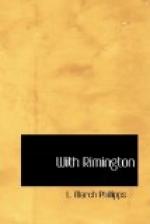Now the great creature wakes for its next crawl. First its antennae, or long feelers, are pushed out in front. Its scouts, that is, among which, if you belong to our corps, you will probably find yourself, go cantering on ahead. They pass the pickets on the hill, who promptly shoulder blankets and turn back to camp, and break into extended order, and throw out little feelers of their own in front and to the sides as they enter an unexplored country. Following them come several companies of infantry, a block of solid strength, marching at the top of the column, and a battery or section of guns. Then comes the long line of convoy waggons, piled high with provisions, fodder, and kit, strengthened and protected at intervals by companies of infantry marching at ease, with the two great cow-guns somewhere about the middle. The tail of the column, like the head, is strengthened by a considerable force of infantry, followed at an interval of a mile or so by the mounted rearguard, which has scattered its scouts far and wide across the track of the column, and withdraws them from point to point as we advance. Likewise to left and right, far out on the plain, the horsemen of the flank guards are scattered in little bands of twos and threes, cantering along or stopping and spying, sniffing cautiously round kopjes or peeping into farms, and by-and-by you will probably hear from one direction or other a few scattered single shots, and yonder two scouts in the distance, lately advancing so quietly, are now seen to be turned and galloping back as hard as they can split, while two or three Mausers crack at them from the sky-line.
It is a pretty sight, from some hill far in advance, to turn back and watch the army coming into view. You push on, scouts feeling the way, to occupy some prominent kopje on the line of march, and climbing up and sitting among the rocks, command with your glasses a view far and wide over the plain. The air has been very cold and sharp, with an intense penetrating cold hitherto, but now the sun is shining and its mellow warmth is instantly felt. The rich pure colour-lines, only seen when the sun, rising or setting, is low in the sky, lie straightly ruled across the plain, brown and orange and pale yellow, and in the distance blue. The ten-mile off rocks look but a mile in this air. Every object, distant or near, is exact to the least detail. So clear are the outlines you would think there was no atmosphere here at all, and that you might be looking out over the unaired landscapes of the moon. One would think that such an air would breed an exceptional race, and that the men, and horses too, for that matter, of this country would show something of the Arab character, sensitive, fiery, and high strung. Yet nothing can be conceived less Arab like than your stolid but practical Dutchman and the underbred screw he rides.




